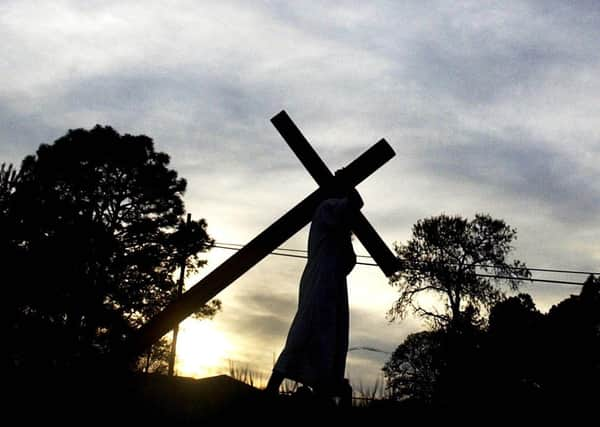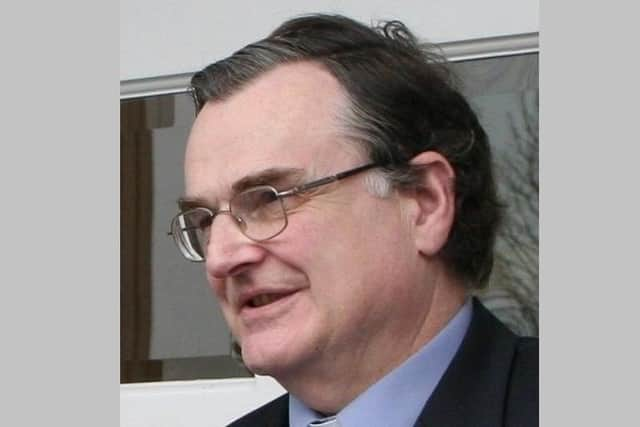Easter message: This Good Friday the shadow of death seems to loom even larger – but remember we have a shepherd to guide us


The circumstances were horrifically brutal.
Yet from the perspective of Christian faith, Christ’s death does at least two important things. It demonstrates the extent of God’s love for the world and for every person in it, and it effects a great reconciliation between God and humanity.
The technical theological term ‘atonement’ speaks, precisely, of ‘at-one-ment’, and the Church calls everyone to see what happened on Good Friday and to hear the message those events convey.
Advertisement
Hide AdAdvertisement
Hide Ad

Perhaps today is unique among the days of the year in that it is a day on which people focus their thoughts very specifically on something everyone would surely prefer not to think about – death.
It is a subject of which no-one can be unaware, especially in these days when the coronavirus is taking so many lives in its own horrifically brutal way.
There is no harm, indeed, in taking a day to reflect both on the events that took place on Golgotha on the first Good Friday, and on death itself.
I am one of those clergy who has a great love of the more traditional ways of worship.
Advertisement
Hide AdAdvertisement
Hide AdSo, when conducting funeral services, I have stuck with the older format. In the Church of Ireland prayer book the service contains these words: “In the midst of life we are in death: of whom may we seek for succour, but of thee O, Lord, who for our sins art justly displeased.”
Then, in what I think is a deeply personally consoling way, it continues: “Thou knowest, Lord, the secrets of our hearts; shut not they merciful ears to our prayers”.
Again, especially at this time of global pandemic, how clear it is that indeed in life, death is never far away.
A former Irish bishop, Jeremy Taylor (1613-1667), penned ‘Holy Living and Holy Dying’. It is a call to – and an instruction for – both a life of virtue and a holy death.
Advertisement
Hide AdAdvertisement
Hide AdDeath will come to every one of us. Even the earthly Jesus, if he had not been killed in what is generally understood to have been his 30s, would eventually have died.
Of course, with faith every person can look beyond that final breath and entrust themselves into the safe keeping of a holy and merciful God in what the Anglican prayer book poetically calls the “heavenly places”.
With the news every day telling of the deathly toll of the coronavirus, every person will surely do well to reflect on their own dying, whether that be today or tomorrow or a long time in the future.
It is something for which every person should quietly prepare. A profoundly private matter, the stark reality of death summons everyone to reflect.
Advertisement
Hide AdAdvertisement
Hide AdOf course, we don’t know how we will react to eventual circumstances, but experience does show that faced with extremities people do look beyond themselves, pray and have perhaps a deeper than usual sense of spirituality.
I was particularly struck by one recent news report indicating that many health professionals who did not normally do so were now stopping to pray before going on duty to tend the coronavirus sick.
New York’s St Paul’s Chapel, an Episcopal church just across the street from the rebuilt World Trade Centre, was left undamaged by the terror attacks on September 11, 2001. It became a spiritual oasis.
St Paul’s is part of the famous Trinity Wall Street parish, which reports of the aftermath of 9/11: “More than 300 clergy volunteered to cover the daily liturgy and to listen to and counsel workers. They often put aside their own grief and spent many sleepless nights soothing those immersed in the tragedy they were dealing with in their work at Ground Zero.
Advertisement
Hide AdAdvertisement
Hide Ad“In the pews, workers whispered their stories and unburdened their minds. Volunteers and workers cried, prayed, and found solace in the communal warmth of St Paul’s.”
The 9/11 attacks, we are told, gave rise to a tremendous community spirit with New Yorkers going out of their way to help the rescue efforts by bringing provisions of all sorts from food to first aid kits to hard hats and blankets.
We have seen a similar community response in the pandemic emergency, with NHS England reporting that over 400,000 people volunteered in just one day to help vulnerable people to stay safe and at home, exceeding the original target by over 100,000.
Also, as reported by this newspaper, here in Northern Ireland similarly in just one day over 4,000 people volunteered following an online Health and Social Care Workforce Appeal.
Advertisement
Hide AdAdvertisement
Hide AdHealth Minister Robin Swann said the volunteering would make “a huge difference”.
In the much loved 23rd Psalm, the psalmist refers to “the valley of the shadow of death”. Yet the psalm is not a lament; it speaks of the spiritual comfort of God’s care.
At the time of dying, loving companionship is surely deeply consoling. Psalm 23 recognises this because, the psalmist says, in the dark valley there is a shepherd who walks with us.
Canon Ian Ellis is a former editor of The Church of Ireland Gazette.
—— ——
A message from the Editor:
Advertisement
Hide AdAdvertisement
Hide AdThank you for reading this story on our website. While I have your attention, I also have an important request to make of you.
With the coronavirus lockdown having a major impact on many of our advertisers - and consequently the revenue we receive - we are more reliant than ever on you taking out a digital subscription.
Subscribe to newsletter.co.uk and enjoy unlimited access to the best Northern Ireland and UK news and information online and on our app. With a digital subscription, you can read more than 5 articles, see fewer ads, enjoy faster load times, and get access to exclusive newsletters and content. Visit https://www.newsletter.co.uk/subscriptions now to sign up.
Our journalism costs money and we rely on advertising, print and digital revenues to help to support them. By supporting us, we are able to support you in providing trusted, fact-checked content for this website.
Alistair Bushe
Editor